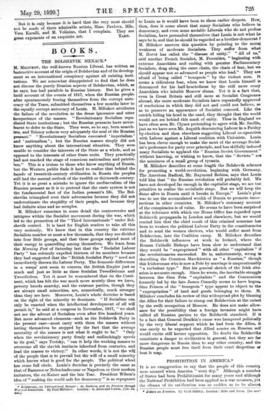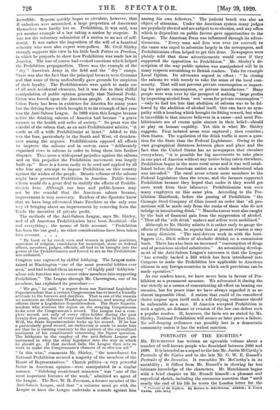PROHIBITION IN AMERICA.*
IT is no exaggeration to say that the people of this country were amazed when America " went dry." Although a numbet of States had been Prohibitionist for many years and althougb the National Prohibition had been applied as a war measure, yet the climax of its ratification was so sudden as to be almost • Fetters on Freedom. By Cecil Shirley. Landon : Mille and Loon. [la. nett incredible. Reports quickly began to circulate, however, that if onlookers were astonished, a large proportion of Americans themselves were hardly less so. Prohibition, it was said, was yet another example of a law taking a nation by surprise. It was not the voluntary submission of a nation to an act of self- denial. It was rather the imposition of the will of a fanatical minority who were also expert wire-pullers. Mr. Cecil Shirley strongly supports this view in his little book Fetters on Freedom, in which he purports to show how Prohibition was made law in America. The war of course had evoked emotions which helped the Prohibition propagandists. There was the example of the
" dry " American Army in the field and the " dry " camps.
There was also the fact that the principal brewers were Germans and that some of them undoubtedly gave grounds for suspicion of their loyalty. The Prohibitionists were quick to make use of all such accidental elements, but it was die to their skilful manipulation of public opinion generally that National Prohi- bition was forced upon the American people. A strong Prohi- bition Party has been in existence for America for many years but the driving force which brought it to its triumph of last year was the Anti-Saloon League. In 1893 when this League became active the drinking saloons of America had become " a grave menace to the health and order of society." So great was the scandal of the saloon that, as an anti-Prohibitionist admits, " it made us all a trifle Prohibitionist at heart." Added to this was the fear, particularly in the South and West, of drunken- ness among the negroes. Prohibitionists opposed all efforts to improve the saloons and in certain cases " deliberately organized rows in saloons in order to bring them into further disgrace. Thus arose a widespread prejudice against the saloons and on this prejudice the Prohibition movement was largely built up." Here is a lesson easily to be read and applied by all who fear any attempt to impose Prohibition on this oountry
against the wishes of the people. Drastic reforms of the saloons might have prevented Prohibition in America. Public house reform would do a great deal to stultify the efforts of Prohibi- tionists here. Although our inns and public-houses may not be the scandal that the American saloon became, improvement is very necessary. Readers of the Spectator know that we have long advocated State Purchase as the only sure
way of bringing about an improvement by removing from the Trade the incentive of private profit.
The methods of the Anti-Saloon League, says Mr. Shirley, and of all American Prohibitionists have been Jesuitical—the end everything ; the means of little account. " Prohibition has been the one goal ; no other considerations have been taken into account. . . .
" By hook or by crook men and women in public positions, ministers of religion, candidates for municipal, state or federal offices, members, lodges, officials, all had to be brought into the power of the Prohibitionists and forced to act as the Prohibition- ists ordained."
Congress was captured by skilful lobbying. The League main- tained at Washington " one of the most powerful lobbies ever seen," and had behind them an army " of highly paid ' lobbyists' whose sole function was to coerce other members into supporting Prohibition." The League through Mr. Cherrington, one of its members, has explained its procedure :— " We get," he said, " a report from our National Legislative Superintendent that a certain Congressman has evinced a friendly attitude to the brewers and distillers. That is one of the reasons we maintain an elaborate Washington bureau, and among other officers there a Legislative Superintendent. The State Superin- tendent who receives the report on the straying Congressman looks over the Congressman's record. The League has a com- plete record, not only of every office-holder during the past twenty-five years, but of every candidate for office in that time. Well, the State Superintendent looks up his record. If he has a particularly good record, an endeavour is made to make him see that he is running contrary to the opinion of the crystallized sentiment of his constituents concerning the liquor question. The lobbyists in the employ of the anti-Saloon League are instructed to whip the stray legislator into the way in which he should go. If that method fails, the League then sets to work to make the Congressman's chances of re-election nil."
" In this wise," comments Mr. Shirley, " the amendment for National Prohibition secured a majority of the members of the House of Representatives." Church politics—a very powerful factor in American opinion—were manipulated in a similar manner. " Subduing recalcitrant ministers " was " one of the most important features of the work," admitted an agent of the League. The Rev. W. H. Freeman, a former member of the Anti-Saloon League, said that " a minister must go with the League or have the League undertake a crusade against him among his own followers." The judicial bench was also an object of attention. Under the American system many judges are popularly elected and are subject to re-election, and any office which is dependent on public favour gave opportunities to the League. The American Press was influenced through its adver-' tisements. " Every man and firm won over (or coerced) to the cause was urged to advertise largely in the newspapers, and Prohibitionists often helped to get this done. Newspapers were plainly told that these advertisements would cease if they supported the opposition to Prohibition." Mr. Shirley's de- scription of the way public opinion was manipulated will be in many respects astonishing to British readers. Take for example Local Option. Its advocates argued in effect : " In closing the saloons we wish merely to take the sense of the local com- munity. That will not prevent private consumption or import- ing for private consumption, or private manufacture." Many people were won over by the prospect of making " large profits by importing alcohol from wet' areas for private consumption " —only to find too late that abolition of saloons was to be fol- lowed by the abolition of alcohol itself. One can have no sym- pathy with a humbug which brought its fitting reward, but what is incredible is that sincere believers in a cause—and most Pro- hibitionists are of course quite sincere in their belief—should so play on human cupidity. Yet this is what Mr. Shirley suggests. First isolated areas were captured ; then counties ; then States. The regulation of the drink traffic is more a ques- tion for the State than the Federal Legislature. Owing to the vast geographical distances between place and place and the fact that the United States has no newspapers that circulate everywhere, "it is possible for big movements to take place in one part of America without any notice being taken elsewhere. Prohibition began in the more rural areas and it was well estab- lished before the American nation as a whole understood what was intended." The rural areas return more members to the Federal Legislature than the towns, and the farmers supported Prohibition because they hoped that under it they would get more work from their labourers. Prohibitionists won over many employers on this same plea,. According to the Pro- hibition Handbook, before the passing of Prohibition " the Carnegie Steel Company of Ohio issued an order that all pro- motions will be made only from the ranks of those who do not indulge in intoxicating drink.' " Manufacturers were also caught by the bait of financial gain from the suppression of alcohol. " Thus all the soft drink' makers and sellers were mobilized."
Although as Mr. Shirley admits it is rather early to gauge the effects of Prohibition, he reports that at present evasion is easy in many districts. " The taxi-drivers work in with the boot- leggers (i.e., illicit sellers of alcoholic drinks) on a commission basis. There has also been an increased " consumption of drugs and of pernicious alcohol substitutes." An astonishing develop- ment of the Anti-Saloon League's successes is that the League " has actually backed a Bill which has been introduced into Congress to make the Prohibition law applicable to American citizens hi any foreign countries in which such provisions can be made operative."
As our readers know, we have never been in favour of Pro- hibition as a permanent measure. We advocated it during the war strictly as a means of concentrating all effort on beating our enemies, but for peace time we have always regarded it as an almost impossible ideal. A nation that could of its considered choice impose upon itself such a self-denying ordinance should be unbeatable as a race. If America accepted Prohibition in such a spirit, no defiance or evasion of the law can defeat such a popular resolve. If, however, the facts are as stated by Mr. Shirley, National Prohibition will sooner or later prove a failure. No self-denying ordinance can possibly last in a democratic community unless it has the widest sanction.







































 Previous page
Previous page